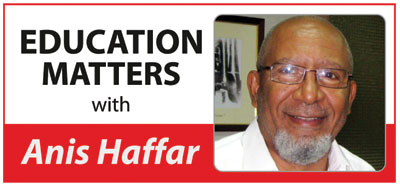Teacher and parent expectations on the youth -Tips from George Bernard Shaw
Arku Jasmine
Education
 Having the biological ability to bear children is one thing; knowing how to raise them as properly functioning confident beings is another. Conversely, for teachers, knowing the details of a subject one teaches is one thing; knowing how to raise the youth as exemplary thinking adults is something else.
Having the biological ability to bear children is one thing; knowing how to raise them as properly functioning confident beings is another. Conversely, for teachers, knowing the details of a subject one teaches is one thing; knowing how to raise the youth as exemplary thinking adults is something else. Many times teachers think that parents know what to do; and parents too assume that teachers know what to do. Putting teachers and parents together is a necessity in order to inform and appreciate the responsibility of parents at home, and the professional duties of teachers at school. The two minds have to merge and work from the same page, so to speak, to influence the best in each youngster. (And that is why Parent Teacher Associations – PTAs - are so important.)
Children are more affected by our behaviour towards them than we think: They watch what we do and don’t do; what we say and don’t say; and, especially, how we feel instinctively about them. Adults are the principal architects in the subtle designs of our children’s inner lives. It’s up to us to imbue in the young fertile minds (and even in adult to adult relationships) the exemplary characteristics and confidence that we expect emulated. People tend to live up – or down - to our expectations of them.
In education psychology, there is something called the “Self-fulfilling Prophecy.” What it means simply is this, if one treats a wife like a queen, she acts like a queen. However, if she is treated like a maid, she begins to act like one. Conversely, if one treats a husband like a king, he acts like one, and so on. It is the same with children: if we treat them like bonafide thinking human beings, they will live up to the expectation. The Self-fulfilling Prophesy is sometimes called the “Pygmalion effect.”
The play, Pygmalion, by George Bernard Shaw (1856 – 1950), comes to mind. In a particular scene, the heroine of the play, the cockney flower girl, Eliza Doolittle, makes a grand entrance at a ball. As Eliza explains to an admirer, Colonel Pickering, “The difference between a lady and a flower girl is the way she is treated. I shall always be a flower girl to Professor Higgins because he always treats me as a flower girl, and always will; but I know I can be a lady to you, because you treat me as a lady, and always will.” In other words, the very same woman – approached in two entirely different ways, by two different men – feels particular ways about herself.
Back to education: I remember teaching a visually impaired Spanish girl in a regular English class in the US. She was partially blind in one eye, and had to angle her head to focus properly. She had my sympathy in that I tended to demand a little less of her than the other students. At a parents’ conference with her mother one day, she asked to see her daughter’s classwork. As she perused it, I assured her that it was a fine performance. She looked me straight in the eye, and said, “Please, expect of my daughter the same qualities you expect of the best students. It’s a rough world out there, and society will make tough demands of her, without sympathy.” Though I had spent years in a School of Education, that caution from a concerned mother was a wake-up call.
The ways teachers might react to a student influence their performances. Where students are labelled potential achievers, they show significant gains. The reasons for these gains was the fact that the teachers expected more of them. This phenomenon, as the Pygmalion effect, showed that teachers’ expectations influenced students to become intelligent in the same way that the expectations of the mythical Greek sculptor, Pygmalion, caused a statue he had carved to come to life. A “self-fulfilling prophecy” about behaviour is often fulfilled. If teachers communicate the “prophecy” that certain students will behave intelligently, those students may behave in the expected manner.
The inadequate school performance of many students from poor backgrounds may be due to low expectations on the part of teachers. Teachers do formulate expectations about pupils, and such expectations often seem to have an impact on pupil behaviour. Teachers may tend to respond more favourably to children from richer backgrounds, to high achievers, to compliant and co-operative children, to attractive students, those who sit in the front and centre sections of classrooms, those with neat handwriting and pleasant speech, etc.
Instructors who are unwilling or unable to try to change their own perspectives seem the least likely to alter initial impressions, and are most likely to cause negative self-fulfilling prophecy reactions.
By Anis Haffar/Daily Graphic/Ghana
Email: [email protected]